Danshen Medication Risk Calculator
Important Safety Notice
This tool calculates potential risks based on medical literature. It does NOT replace professional medical advice. If you're taking heart medications and Danshen, stop immediately and consult your doctor.
Many people assume that if something is natural, it’s safe-especially when it comes to herbal supplements. But when you’re taking heart medications, that assumption can be deadly. Danshen, a traditional Chinese herb used for heart health, is one of the most dangerous supplements you can mix with common cardiac drugs. It doesn’t just slightly increase risk-it can send your INR through the roof, cause internal bleeding, and land you in the ER.
What Exactly Is Danshen?
Danshen, also known as Salvia miltiorrhiza or red sage, isn’t some new fad. It’s been used in Chinese medicine for over 2,000 years. Its root is dried and made into teas, capsules, or injectable solutions. In China, it’s even approved as a prescription medicine for heart attack recovery and stroke prevention. But in the U.S., it’s sold as a dietary supplement-with no standardization, no dosing guidelines, and no safety monitoring. The active compounds-tanshinones and salvianolic acids-do have real biological effects. They thin the blood, lower blood pressure, and open up coronary arteries. Sounds helpful, right? But here’s the problem: these effects aren’t controlled. One bottle of Danshen might contain 0.05% tanshinone. Another might have 5.2%. That’s a 100-fold difference. There’s no way to know what you’re actually taking.Why Danshen Is Dangerous With Heart Medications
The biggest danger comes from mixing Danshen with anticoagulants and antiplatelet drugs. If you’re on warfarin (Coumadin), rivaroxaban (Xarelto), apixaban (Eliquis), or even aspirin, Danshen can turn a safe dose into a life-threatening one. Here’s how it works: Danshen inhibits the liver enzyme CYP2C9, which is responsible for breaking down warfarin. When that enzyme gets blocked, warfarin builds up in your blood. Your INR-the measure of how long it takes your blood to clot-spikes. Normal INR for someone on warfarin is 2.0-3.0. One documented case showed an INR of 8.4. That’s more than triple the upper limit. At that level, even a minor bump can cause internal bleeding. And it’s not just warfarin. Danshen also interferes with newer blood thinners like rivaroxaban. A 2022 NIH study found Danshen tablets strongly inhibit the metabolism of rivaroxaban, increasing the risk of bleeding without any way to reverse it. Unlike warfarin, which can be reversed with vitamin K or fresh plasma, there’s no antidote for Danshen’s effects. Once it’s in your system, you’re at the mercy of your body’s ability to clear it-slowly, unpredictably.Real Cases, Real Consequences
This isn’t theoretical. There are documented cases of people bleeding out after taking Danshen with their heart meds. - A 62-year-old man with a mechanical heart valve took Danshen for two weeks while on warfarin. His INR jumped to 8.4. His hemoglobin dropped to 7.6 g/dL-he needed a blood transfusion. He had internal bleeding from his stomach. - A 48-year-old woman on warfarin took Danshen every other day for a month. Her INR went from 2.8 to 5.6. She had nosebleeds and bruising all over her body. She had to stop Danshen and wait weeks for her INR to stabilize. - A 66-year-old man with gastric cancer was on stable warfarin (INR 2.0). He took Danshen for three days before his surgery. His INR shot to 5.5. He bled excessively during the procedure. A 2020 study in Taiwan tracked 17 more cases between 2015 and 2019. Every single one involved a dangerous rise in INR after Danshen use. The average INR jumped from 2.3 to 5.8. That’s not a coincidence. That’s a pattern. Reddit threads are full of similar stories: “My INR went from 2.5 to 6.0 after my TCM practitioner gave me Danshen with my Eliquis.” “ER visit after taking Danshen with warfarin-never again.”
Doctors Don’t Always Know You’re Taking It
Here’s the scary part: most patients don’t tell their doctors they’re taking Danshen. A 2019 JAMA Internal Medicine survey found only 28% of people using herbal supplements mentioned them to their physicians. Why? Because they think it’s “just a supplement.” Or because their TCM practitioner told them it’s safe. Or because they don’t think their cardiologist cares. But they should. A 2022 American College of Cardiology statement specifically recommends screening all patients on anticoagulants-especially those of Asian descent-for Danshen use. Why? Because 41.7% of Chinese immigrants in the U.S. regularly take Danshen while on heart meds, and only 32.4% tell their doctors.What About Other Heart Medications?
Danshen doesn’t just mess with blood thinners. It can also interfere with:- Beta-blockers: Danshen lowers blood pressure. Combine that with metoprolol or atenolol, and you risk dangerously low BP, dizziness, or fainting.
- Calcium channel blockers: Danshen blocks calcium channels too. Taking it with amlodipine or diltiazem can overdo the effect, leading to heart rhythm problems.
- Statins: Some studies suggest Danshen may increase the risk of muscle damage when taken with statins like atorvastatin.
Why Isn’t It Banned?
The FDA doesn’t approve supplements for safety or effectiveness before they hit the market. Danshen is sold as a “dietary supplement,” so it doesn’t need FDA approval. That’s why you can buy it at Walmart, GNC, or Amazon-even though the FDA has issued multiple warnings about unapproved Danshen products. China regulates Danshen as a drug. Their injectable forms are approved and monitored. But the capsules you buy online? No oversight. No batch testing. No accountability. The European Medicines Agency (EMA) requires warning labels on Danshen products sold in Europe: “May increase bleeding risk when used with anticoagulants.” But in the U.S.? No such requirement.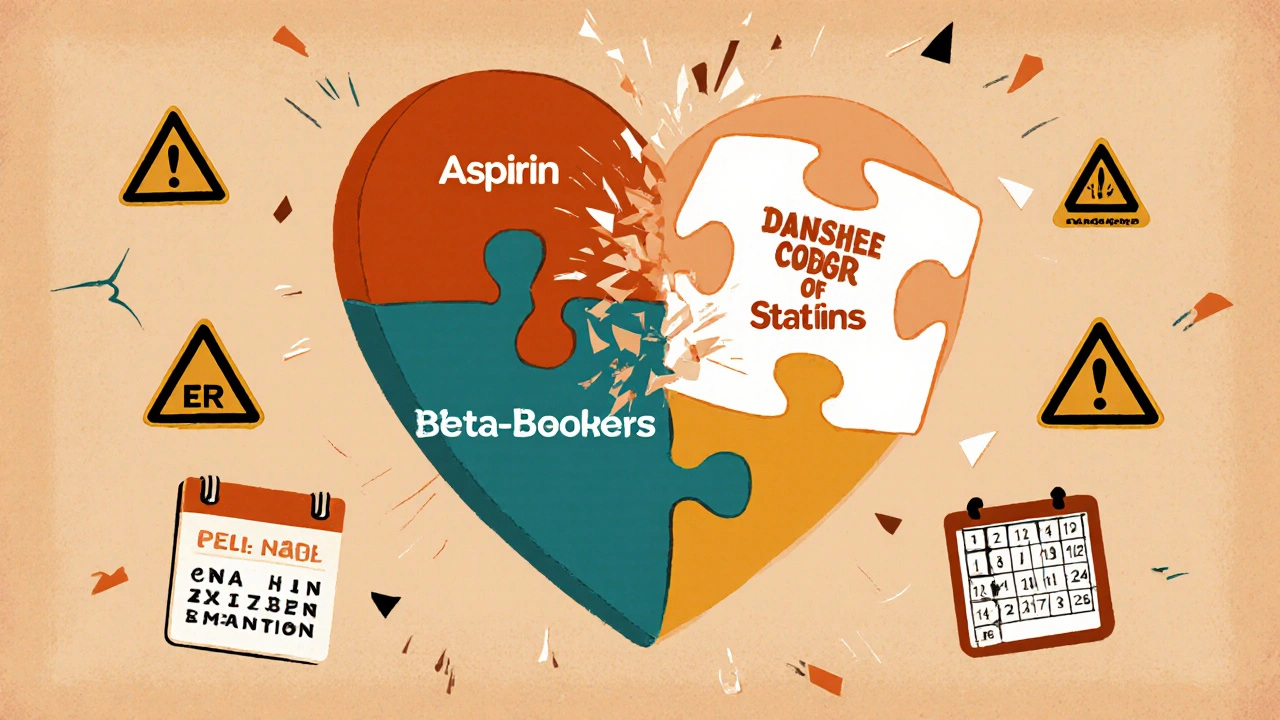
What Should You Do?
If you’re on any heart medication-especially blood thinners-stop taking Danshen immediately. Don’t wait. Don’t taper. Just stop. Tell your doctor. Bring the bottle. Show them the label. Ask: “Is this safe with my current meds?” If your doctor doesn’t know, ask for a referral to a pharmacist who specializes in drug interactions. If you’re considering Danshen for heart health, talk to your cardiologist first. There are proven, tested treatments: aspirin, statins, beta-blockers, ACE inhibitors. They work. They’re monitored. They have clear guidelines. Danshen doesn’t.What Are the Alternatives?
If you’re looking for natural support for heart health, focus on evidence-based approaches:- Omega-3 fatty acids: Proven to lower triglycerides and reduce inflammation. Safe with most heart meds.
- Coenzyme Q10: May help with statin-related muscle pain. No known bleeding risk.
- Exercise: 150 minutes a week of moderate activity cuts heart disease risk by 30%.
- Diet: The DASH or Mediterranean diet lowers blood pressure and improves cholesterol without side effects.
Final Warning
“Natural” doesn’t mean safe. “Traditional” doesn’t mean risk-free. Danshen has real pharmacological effects-and they’re not gentle. When combined with heart medications, it’s like adding gasoline to a fire. Your heart is too important to gamble with. Don’t let a supplement with unknown ingredients, unregulated doses, and proven deadly interactions become your undoing.Can I take Danshen with warfarin if I monitor my INR closely?
No. Even with close INR monitoring, Danshen’s effects are unpredictable. One study showed INR levels spiked from 2.3 to 5.8 within days of starting Danshen-even when patients were already on stable warfarin doses. The variability in Danshen’s active compounds means the same dose can have wildly different effects from one bottle to the next. There is no safe threshold. Major medical organizations, including the Cleveland Clinic and Natural Medicines Comprehensive Database, explicitly state: Do not take this combination.
Is Danshen safe with newer blood thinners like Eliquis or Xarelto?
No. A 2022 NIH study found Danshen inhibits the metabolism of rivaroxaban (Xarelto), leading to higher drug levels in the blood and increased bleeding risk. Unlike warfarin, there’s no easy way to reverse the effects of these newer anticoagulants, and Danshen adds another layer of unpredictability. No clinical guidelines support combining them. The risk of bleeding-especially in the brain or gut-is real and documented.
Why do some TCM practitioners recommend Danshen for heart patients?
In China, Danshen is used as a regulated prescription medicine, often in controlled doses and sometimes alongside conventional treatment under medical supervision. But in the U.S., most practitioners selling Danshen as a supplement are not licensed medical doctors. They may not be trained in Western pharmacology or aware of drug interactions. What’s considered safe in a clinical setting in China doesn’t translate to the unregulated supplement market in North America.
How long does Danshen stay in my system?
There’s no clear answer. Danshen contains multiple active compounds with different half-lives. Tanshinones can linger for days, and their effects on liver enzymes can persist even after you stop taking it. One case report showed elevated INR levels for over a week after stopping Danshen. Until more research is done, assume its effects last at least 7-10 days after your last dose.
Are there any supplements that are safe to take with heart medications?
Yes-but you still need to check. Omega-3 fatty acids, CoQ10, magnesium, and fiber supplements like psyllium are generally considered safe with most heart medications when taken in standard doses. However, even these can interact. For example, high-dose omega-3s can increase bleeding risk when combined with blood thinners. Always talk to your doctor or pharmacist before starting any new supplement, even if it’s labeled “natural” or “safe.”
If you’re currently taking Danshen and a heart medication, stop immediately and contact your healthcare provider. Your life depends on it.
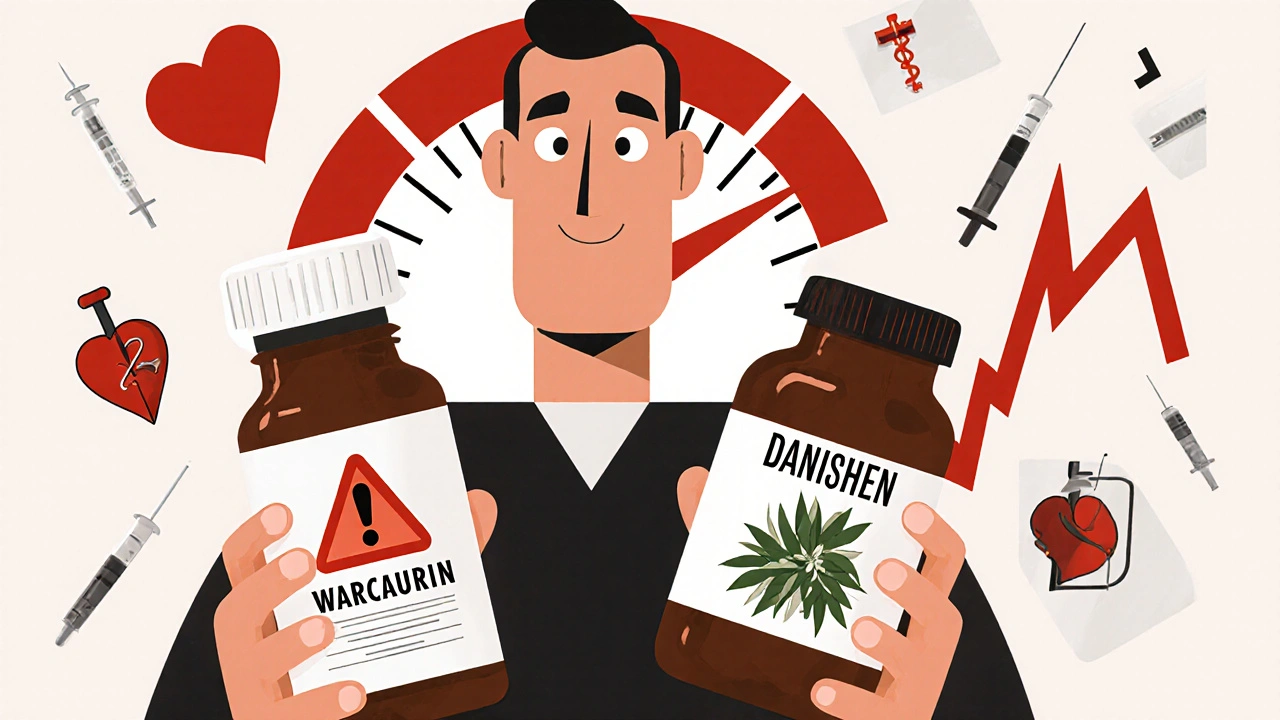

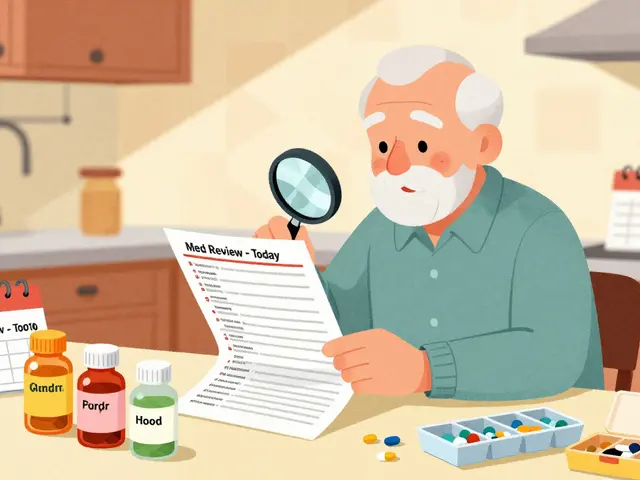

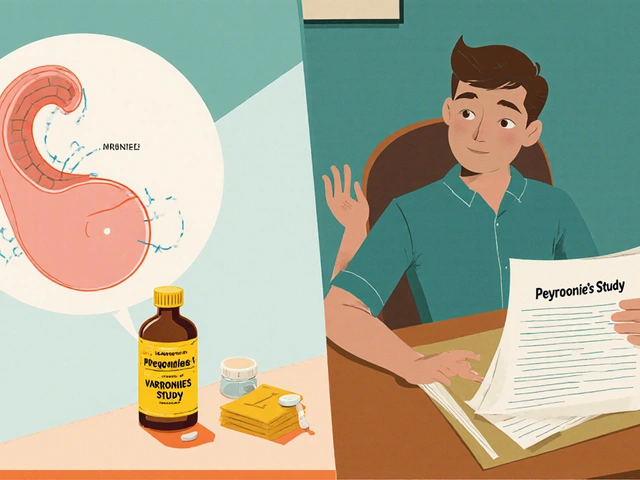
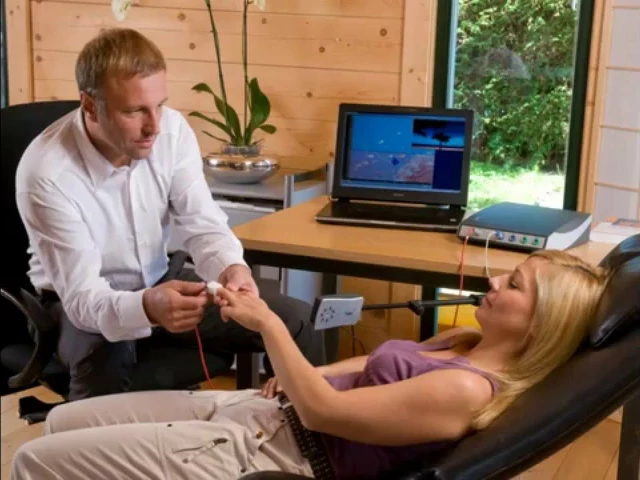

Geethu E
27 November 2025 - 22:38 PM
I took Danshen for three months last year with my blood pressure meds and never thought twice about it. My doctor never asked, and I didn’t think to tell her. Now I’m terrified. I’ve stopped it cold turkey and booked an INR test tomorrow. If you’re on anything heart-related, just don’t. It’s not worth the gamble.
Also, why do supplement companies even get to sell this stuff without warning labels? The FDA is asleep at the wheel.
anant ram
29 November 2025 - 04:46 AM
Wait-wait-wait. Let me get this straight: you’re telling me that a herb used for 2,000 years, in a culture that’s been practicing medicine longer than the U.S. has existed, is suddenly dangerous because it’s ‘unregulated’ here? That’s like banning sushi because some guy in Nebraska uses bad tuna.
It’s not the herb-it’s the lack of standardization. The problem isn’t Danshen-it’s the Walmart bottle labeled ‘Pure Salvia Miltiorrhiza’ with no batch code. Stop blaming the plant. Blame the capitalist snake-oil vendors.
Also-check your dosage. If you’re taking 500mg, you’re probably fine. If you’re taking 1,500mg of mystery powder? Yeah, that’s a problem. Context matters.
And yes-I’m a pharmacist. I’ve seen this before.
king tekken 6
30 November 2025 - 14:01 PM
Okay but have you ever thought that maybe the FDA is just protecting Big Pharma’s profits? Like, if everyone started using Danshen instead of Eliquis, pharma would lose billions. That’s why they’re scared. They don’t care if you bleed-they care if you stop buying pills.
Also, I read on a forum that Danshen is actually a government mind-control herb. The Chinese government puts it in the water to make people docile. That’s why they allow it as a drug there. They’re conditioning us. Think about it.
My cousin’s neighbor’s dog got sick after eating a Danshen capsule. Coincidence? I think not.
Also, I spelled ‘Danshen’ wrong in my last comment. Oops.
Also, I’m not a doctor, but I play one on YouTube.
DIVYA YADAV
1 December 2025 - 19:21 PM
Of course Western medicine hates Danshen. It’s Chinese. It’s ancient. It works without patents. That’s why they’re panicking. The U.S. doesn’t want you healing yourself with herbs-it wants you dependent on their $500 pills. They don’t want you to know that your great-grandmother’s remedy is safer than their lab-made chemicals.
They call it ‘unregulated’? Ha. It’s regulated in China, where real medicine is practiced. Here? We let corporations sell sugar water as ‘vitamins’ and call it ‘innovation.’
They banned turmeric for years too. Then it became a billion-dollar industry. Same story. They’re scared of natural cures because they can’t control them. They can’t patent the moon, but they’ll patent your pain.
Stop listening to Western doctors who’ve never held a root in their hands. Your body knows what it needs. Stop letting them poison you with their ‘evidence.’
Kim Clapper
3 December 2025 - 15:05 PM
I find it deeply concerning that anyone would consider ingesting a botanical substance with unquantifiable pharmacological effects, especially in the context of a chronic cardiovascular condition requiring precise pharmacokinetic management. The lack of standardized dosing, coupled with the absence of mandatory disclosure protocols in the U.S. supplement industry, constitutes a systemic failure of public health governance.
Moreover, the emotional appeal of ‘natural’ as inherently benign is a dangerous cognitive bias, one that has historically led to catastrophic outcomes in medical ethics.
Perhaps we should consider a national registry for supplement use among anticoagulated patients. I’d be happy to draft a white paper.
Bruce Hennen
5 December 2025 - 11:29 AM
Stop. Just stop. You don’t get to say ‘natural’ and then act surprised when it interacts with your meds. This isn’t a conspiracy. This is pharmacology 101. Herbs are drugs. They have active compounds. They have half-lives. They have enzyme interactions. If you think your body can’t tell the difference between a pill and a powder, you’re not just wrong-you’re dangerous.
And yes, I’ve read the NIH papers. I’ve seen the case reports. I’ve reviewed the FDA advisories. There’s no ambiguity here. Danshen + anticoagulants = bad news.
Also, if you’re still taking it, you’re not ‘holistic.’ You’re reckless.
Jake Ruhl
5 December 2025 - 16:08 PM
Okay so like… I used to take Danshen with my Eliquis because my yoga teacher said it ‘cleanses the heart chakra’ and now I’m scared I’m gonna bleed out in my sleep. Like, I didn’t even know this stuff was a thing. I thought it was just a tea for old people in China. Now I’m googling ‘how to tell if you’re bleeding internally’ at 3am. I’m crying. I’m a mess.
Also, I just Googled ‘Danshen’ and the first thing that came up was a guy selling it on Amazon with a picture of a dragon. That’s not reassuring. I’m deleting my cart. I’m done. I’m going back to my statin. I miss my statin.
Also, I think my cat knows I’m taking herbs. She’s been staring at me weirdly.
Chuckie Parker
5 December 2025 - 22:58 PM
Herbs aren’t safe. Pills aren’t safe. Everything interacts. But Danshen? It’s a known killer. Stop pretending it’s some mystical ancient wisdom. It’s a blood thinner. It’s not a tea. It’s a drug. If you’re on warfarin, you’re already in a minefield. Don’t throw a match in it.
And yes, I’m Indian. I grew up with this stuff. My grandma used it. So what? She didn’t have a mechanical valve. Your grandma didn’t have a prescription for Xarelto. Times change. Adapt or die.
Also, stop blaming the FDA. They didn’t make you buy it. You did.
George Hook
6 December 2025 - 09:27 AM
I appreciate the depth of this post and the urgency it conveys. I’m a 68-year-old on warfarin for atrial fibrillation. I’ve been taking a Danshen supplement for two years because I thought it would help my circulation. I didn’t realize how dangerous it was. I’ve stopped immediately and called my cardiologist. He was shocked I hadn’t mentioned it before.
I’ve since learned that over 40% of South Asian immigrants in the U.S. use Danshen without telling their doctors. That’s a massive gap in care. We need better education-not just for patients, but for doctors too. Many don’t know what Danshen is, let alone how it interacts with anticoagulants.
Maybe we need community outreach programs-flyers in temples, clinics, pharmacies-targeted at older adults who rely on traditional remedies. This isn’t about dismissing culture. It’s about protecting lives within culture.
Thank you for raising this. I hope this thread saves someone’s life.
Also, I’ve started walking 30 minutes a day and eating more fish. It’s not glamorous, but it’s safe.